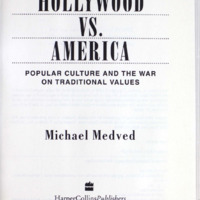-
Description
-
Film critic Michael Medved examines how Hollywood has broken faith with its public, creating movies, television, and popular music that exacerbate every serious social problem we face, from teenage pregnancies to violence in the streets. Michael Medved powerfully argues that the entertainment business follows its own dark obsessions, rather than giving the public what it wants: In fact, the audience for feature films and network television has demonstrated its profound disillusionment in recent years, with disastrous consequences for many entertainment companies. Meanwhile, overwhelming numbers of our fellow citizens complain about the wretched quality of our popular culture - describing the offerings of the mass media as the worst ever. Medved asserts that Hollywood ignores - and assaults - the values of ordinary American families, pursuing a self-destructive and alienated ideological agenda that is harmful to the nation at large and to the industry's own interests. In hard-hitting chapters on "The Attack on Religion," "The Addiction to Violence," "Promoting Promiscuity," "The Infatuation with Foul Language," "Kids Know Best," "Motivations for Madness," and other subjects, Medved outlines the underlying themes that turn up again and again in our popular culture. He also offers conclusive evidence of the frightening real-world impact of these messages on our society and our children. Finally, Medved shows where and how Hollywood took a disastrous wrong turn toward its current crisis, and he outlines promising efforts both in and outside the industry to restore a measure of sanity and restraint to our media of mass entertainment. Sure to elicit strong response, whether it takes the form of cheers of support or howls of enraged dissent, Hollywood vs. America confronts head-on one of the most significant issues of our times.
-
Identifier
-
407945
-
006016882X
-
Creator
-
Medved, Michael
-
Format
-
1st ed.
-
Source
-
Brian Lamb Booknotes Collection
-
Gift of Brian Lamb, 2011.
-
Catalog record
-
Language
-
eng
-
Date
-
1992
-
Program air date: December 27, 1992.
-
Publisher
-
HarperCollins
-
George Mason University. Libraries. Special Collections & Archives
-
Text
-
Transcription of Annotations
Notes on front endpapers: TV--30 hours a week. P. 26 NEA. 33% never go to a movie; 45%-2 a year. 350 pieces of legislation--censorship p. 321. Production code. American Enterprise Institute. Lichter, Rothman, Richard Grenier. Right-wing extremist--religious fanatic. 1989 82% movies too violent; 80% too much profanity; 72% too much nudity. Three major TV networks--lost 1/3 of nightly audience--30 million viewers. Cumulative profits sunk from $800 million in 1984 to $400 million by 1988, to less than zero in 1991. Rock 'n' roll--share of music industry take 46.2% in 1988, 37.4% in 1990. Attendance at rock concerts across nation plunged by more than 30%. 45% of all Americans identified as infrequent moviegoers--less than twice a year--33% declared that they never go to movies. 1991 height of summer season, ticket sales plunged more than 31%; video rentals declined 6%. 1. Religion; 2. Violence; 3. Patriotism; 4. Vulgar behavior. True sickness in the soul. 'Black or White'--Michael Jackson apologized--upset to think that video might influence destructive, violent or sexual behavior. Always tried to be a good role model, made changes to video--regret pain or hurt inspired from Black or White. 1. Most powerful, highly paid, widely respected titans in Hollywood are hopelessly out of touch with the public they are trying to reach. 2. American people understand that media images influence real-life behavior. 3. 'Black or White' controversy proves that an outraged audience can force changes on even the most powerful figures in show business. Book will outrage majority of show business professionals--potentially permanent estrangement--in their view I am a traitor to industry. Might become most hated man in Hollywood. Audience seldom walks away from experience s with warming glow of joy or satisfaction. Arts establishment encourages all-out assault on sense of comfort/coherence, turning suspicious eye on any efforts that respect convention. Daring, unorthodox, experimental. Hollywood's Gilded Era--portrayed clergymen in a sympathetic light. 1991 Watching America--S. Robert Lichter, Linda Lichter, Stanley Rothman--7,365 major characters. Just over one in every hundred census-coded characters had religious vocation--numbers dipped below 1% since 1975. American Family Association--Rev. Donald Wildmon. Media Research Center in Washington, D.C. National Coalition on Television Violence. July 1990, Newsweek--art busters. Boycott weapon--threat of sponsor boycotts. Simpsons promise to continue to confuse and frighten the American public. Ed Begley, Jr.--media is essential for getting message across. There's not time to go door-to-door.
-
Subject
-
"Motion pictures--Moral and ethical aspects."
-
"Television broadcasting--Moral and ethical aspects."
-
"Popular culture--Moral and ethical aspects--United States."
-
"Culture conflict--United States."
-
"Culture in motion pictures."
-
Relation
-
Original Booknotes interview
-
Rights
-
This work may be protected by copyright laws and is provided for educational and research purposes only. Any infringing use may be subject to disciplinary action and/or civil or criminal liability as provided by law. If you believe that you are the rights-holder and object to Mason’s use of this image, please contact speccoll@gmu.edu.
 407945.pdf
407945.pdf